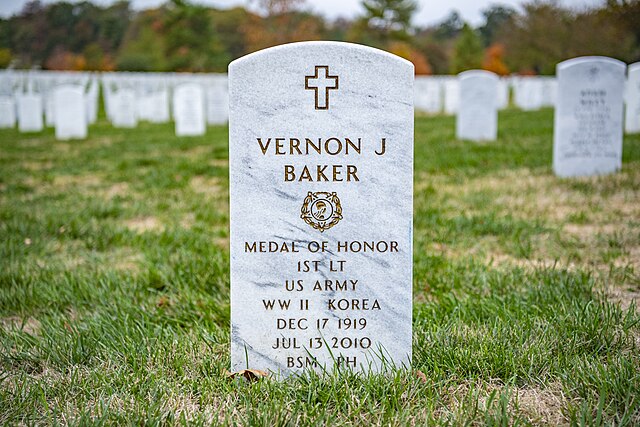Throughout history, countless heroes have emerged in times of war, demonstrating great bravery and resilience. The hero we are highlighting this month is 1st Lt. Vernon Baker, a World War II and Korean War veteran whose remarkable life was marked by hardship, perseverance, and extraordinary valor. His journey, from a tragic childhood to earning the Medal of Honor, is a testament to his unyielding spirit and dedication to his country.
Early Life and Overcoming Adversity
Vernon Baker was born in 1919 in Cheyenne, Wyoming. His early years were filled with hardship, as his parents were killed in a car accident when he was just four years old. Orphaned, Baker and his two sisters were raised by their grandparents in Clarinda, Iowa. His grandfather became his guiding figure, teaching him essential survival skills like hunting to help provide for the family. Baker often credited his grandfather as the most influential person in his life.
Tragedy struck again when his grandfather passed away from cancer shortly after Baker graduated from high school. Seeking stability, Baker took a job with the railroad. However, his ambitions stretched beyond that life, and he attempted to enlist in the U.S. Army. Facing racial discrimination, he was initially denied entry, with a recruiter bluntly telling him, “We don’t have any quotas for you people.” Undeterred, Baker persisted, and in June 1941, he was finally accepted into the Infantry.
Military Service and World War II Heroics
Baker was assigned to the 25th Infantry Regiment, first at Geiger Field near Spokane, Washington, and later at Fort Huachuca, Arizona. Initially serving as a supply sergeant, he later received an offer to attend Officer Candidate School. After completing 13 weeks of rigorous training at Fort Benning, Georgia, he emerged as a second lieutenant. Assigned to C Company, 370th Regiment, 92nd Infantry Division—a segregated unit—Baker was about to face the toughest tests of his life.
Combat and Heroism in Italy
On June 15, 1944, Baker’s regiment left Hampton Roads, Virginia, bound for Naples, Italy. As part of the Fifth Army, they advanced north, engaging in brutal combat along the treacherous Gothic Line. During one of these intense battles, Baker was wounded but refused to let his injuries deter him. Upon recovery, he returned to the battlefield, now leading a group of young and inexperienced soldiers.
His leadership and valor in combat earned him several military decorations, including the Distinguished Service Cross, the Bronze Star, and the Purple Heart. Baker’s bravery and strategic acumen played a crucial role in overcoming formidable enemy defenses.
Breaking Barriers in the Military
Baker continued his service after World War II, playing a pivotal role in the integration of the U.S. military. In 1951, during the Korean War, he became one of the first Black officers to lead an all-white company, a testament to his exemplary leadership and the changing tides within the armed forces.
A Long Overdue Honor
In 1996, Baker received unexpected news—his wartime record was being reevaluated. A year later, on January 13, 1997, he was among seven Black American veterans who had their Distinguished Service Cross upgraded to the Medal of Honor. Of the seven, Baker was the only one still alive to personally receive the prestigious award from President Bill Clinton. This long-overdue recognition solidified his legacy as one of the most decorated African American soldiers of World War II.
Later Years and Legacy
In 2008, Baker was honored with the American Spirit Award from the National WWII Museum, further cementing his place in history. He spent his final years in Benewah Valley, Idaho, where he lived with his family. Over the course of his life, he married three times and had three children.
After a long battle with cancer, Vernon Baker passed away on July 13, 2010, at the age of 90 in St. Maries, Idaho. His final resting place is Arlington National Cemetery, where his remarkable service and sacrifice continue to be honored.
1st Lt. Vernon Baker’s life is a powerful testament to resilience, courage, and the pursuit of justice. From overcoming racial discrimination to leading soldiers in battle, he shattered barriers and paved the way for future generations. His story serves as an enduring reminder of the sacrifices made by those who fight for freedom, equality, and honor. Read more about his life and service here.
We support all who sacrificed for our freedoms in WW2 and beyond. That’s why we support a bill we call The Elder Relief Act. Learn more about this important act here.
